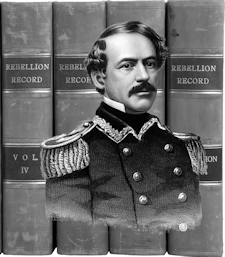Wednesday, January 22, 1862. — Cold, threatening rain or snow all day. … In the evening reports from Raleigh. Three of Company K, Thirtieth, and young Henderson, scout Company H, captured by the enemy. Report says no fighting except by Henderson. No other fired a gun. Rumor says they were drunk.
A great bushwhacker captured with three others. In the night bushwhacker taken with pains in his bowels — rolled over the floor, etc., etc., suddenly sprang up, seized two muskets and escaped! This is the official (false!) report. The other prisoners report that the sentinels were asleep, and the bushwhacker merely slipped out, taking two muskets with him.
Report says that three thousand milish of Mercer [County] are on or near Flat Top Mountain twenty miles from Raleigh and thirteen hundred cavalry!!
Three prisoners brought down last night. Captain McVey, a bushwhacking captain, armed with sword and rifle, was approaching a Union citizen’s house to capture him, when [the] Union man, hearing of it, hid behind a log, drew a bead on Secesh as he approached, called out to him to lay down his arms, which Secesh prudently did, and thereupon the victor marched [him] to our camp at Raleigh. Another prisoner, a son of General Beckley, aged about sixteen. Why he was taken I don’t understand. He carried dispatches when the militia was out under his father, but seems intelligent and well-disposed. Disliking to see one so young packed into a crowded guardhouse (thinking of Birch and Webb, too), I took him to my own quarters and shared my bed with him last night. He talked in his sleep incoherently, otherwise a good bedfellow.











